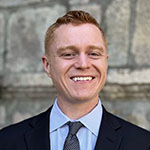During Alec Helmke's undergraduate and early professional education, he developed a passion for working alongside marginalized populations and promoting healthcare access. This work included learning with incarcerated men in a state penitentiary and serving with medical professionals in rural El Salvador.

"However, at-risk groups exist closer to home than we often realize," said Helmke, who is now a Doctor of Pharmacy/Masters in Healthcare Administration student. "The U of M Mobile Health Initiative sparked my interest as the program pushes clinicians to engage with patients where they are at, rather than requiring patients to come to them. As I learned in El Salvador, the easier patients can access treatment, the better health outcomes tend to be."
Over the past few years, Helmke has volunteered at several Mobile Health Initiative (MHI) events, including those specifically for migrant farmworkers in Minnesota. He said MHI has appealed to his innate passion for healthcare access.
"In 2021, Sydney Geiger - one of the program's many dedicated, gifted, and socially conscious volunteers - reached out to me and connected this passion of mine with the shared goal of all MHI members to support and uplift our Minnesota community. Knowing that few pharmacists or pharmacy students have participated in the initiative, I valued the chance to represent my profession and to learn how pharmaceutical care can effectively integrate into the MHI model. And, as a Spanish-speaker, I hoped to use my abilities to make patients feel more comfortable and engaged with their care," he said.
Through the MHI, Helmke says he hoped to learn more about how to treat common conditions like diabetes and hypertension, while also growing more competent caring for patients across the socioeconomic spectrum.
"Social concerns are frequently less prevalent in health education than medical concerns, so I intended to expand my knowledge base through the MHI to become a more competent pharmacist and healthcare administrator," he said. "Having little experience with the migrant farmworker population, I also hoped this experience would provide me with greater insight regarding a historically marginalized group that fulfills a foundational role in our nation and that I may someday care for as a pharmacist."
Helmke says his experience with MHI has been wonderful.
"Each MHI event has offered the chance to work alongside different patients and develop connections with the migrant farmworker community," he said. "I have valued the chance to cooperate with other MHI team members to collectively make a positive impact on the lives of patients who frequently have few other healthcare options. MHI has complimented my didactic learning in the classroom and my extracurricular education at the Phillips Neighborhood Clinic in South Minneapolis, while also giving me the chance to meet new colleagues from across the interprofessional spectrum. I have been privileged to be a part of the program."
Although his career plans are not fully defined, Helmke intends to make healthcare access a central element of his future vocation.
"Upon graduation, I will likely complete a pharmacy residency program in the Twin Cities area with hopes of continuing to work alongside marginalized patient populations. In an ideal future, I would love to dedicate my time to global health and use my pharmaceutical and administrative knowledge to provide patients and clinicians with the drugs they need to promote optimal health outcomes," he said.



